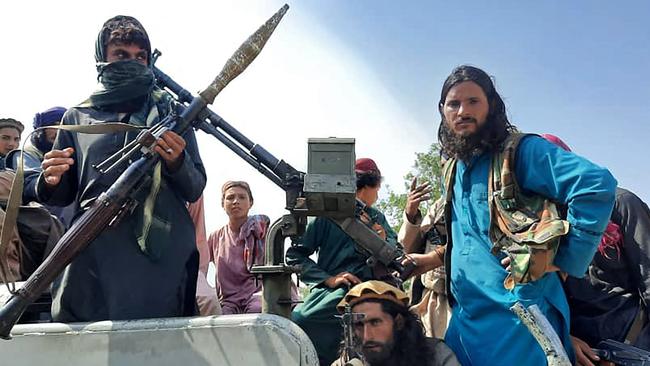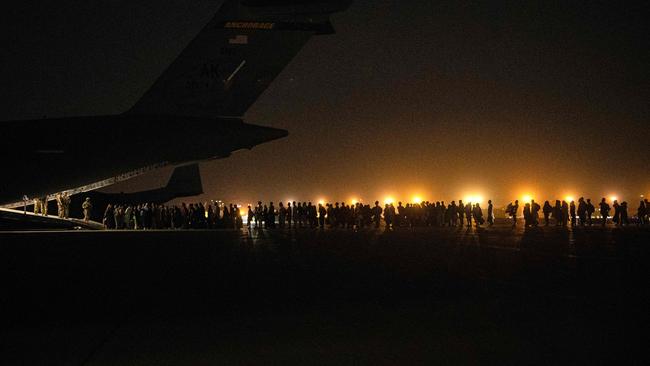Christopher Pyne: Despite US pulling out, Afghanistan civil war will continue to rage
War in Afghanistan was already going on for decades before the 2001 invasion. Now, 20 years later, it’s still far from over, writes Christopher Pyne.
Opinion
Don't miss out on the headlines from Opinion. Followed categories will be added to My News.
Despite many people’s desire to declare the war in Afghanistan over and digest a neat solution, however heinous, the truth is far from that fantasy.
The idea that the Taliban has won, are back in government and therefore the reality show can move on is too simplistic. The war was going for almost 22 years before the Coalition invasion. It never stopped and it is clear that it is going to keep going for the foreseeable future.
Afghanistan has been at war since 1979 when the Soviet Union, now Russia, invaded and established a puppet communist leadership in Kabul.
The United States of America backed the mujahidin in their resistance to Soviet rule and eventually the Soviets left, defeated at the hands of Afghan fighters and financially broke from its arms race with the US.
An endless civil war has continued since then. It is a war between ancient tribes, militias, warlords, foreign terrorist organisations using Afghanistan as a base and governments that have come and gone.
The Taliban “ruled” the country from 1996 to 2001. But the civil war never ended.

They made the mistake of allowing Osama bin Laden and his terrorist organisation, al-Qa’ida, to use Afghanistan as a training base and headquarters from which they planned and executed the grotesque murder of thousands of innocent office workers and others in the World Trade Centre in New York, on September 11, 2001. I imagine they regret that now.
Their bad judgment brought the wrath of the greatest military power in world history down on their heads. The US and its allies, of which we are one, invaded Afghanistan and in a short time destroyed the terrorist networks, degraded the Taliban’s military capability, restored order in most of the country and created a functioning democracy that improved the lives of the citizens there beyond their wildest imaginations. However, the Taliban wasn’t eliminated. The simmering civil war continued throughout the past 20 years.
The government of Afghanistan that has been deposed in Kabul was certainly less than ideal.
It was endemically corrupt. But, unlike the Taliban, it did not persecute minorities, blow up ancient Buddhist shrines, block women from working or girls from going to school – or marry girls as young as 12 to much older men.
The foundation of this defeat began before President Joe Biden’s election.
He is copping a fair amount of criticism. He should be. There is no doubt that the hasty US withdrawal in the past few months was catastrophic for the morale of the Afghan Defence Force.
The US abandonment of core requirements for the Afghan military to defeat the Taliban, such as co-ordinated air strikes, maintenance of platforms and logistical support, was the main reason for the Afghan Defence Force’s collapse in the face of the Taliban offensive.
The idea that the Afghan military is an incompetent and cowardly fighting force is not true. It is a narrative being set up to salve the United States’ collective conscience. But it isn’t right.
Having been trained by the US and its allies, the Afghans rightly bore the brunt of the fighting and the casualties. Since 2014, the Afghans have endured 70,000 casualties.
The number of casualties the US and its allies have sustained since President Obama began withdrawing troops and taking our forces out of combat roles has been minuscule in comparison.
There are other punctuation points in the story of this defeat. The decision of former United States president Donald Trump to flag and then significantly reduce the US commitment to Afghanistan was premature, unnecessary and seemingly against the advice of his military leaders.
Another was his failure to support his Kurdish allies in Syria against the governments of Turkey and Syria in 2019. It sent a powerful message to the Taliban that the US was unreliable.
Worse still, Trump opened peace talks with the Taliban, excluding the legitimate Afghan government.

In exchange for the Taliban attending, Trump forced his Afghan allies to release 5000 battle-hardened Taliban prisoners, who you could assume melted seamlessly back into the Taliban fighting machine and had even more of an axe to grind than they had before they had been incarcerated in an Afghan prison.
Tragically for the people of Afghan, the Taliban victory does not signal an end to the conflict.
Even now, the remnants of the Afghan Defence Force are regrouping in the Panjshir Valley in north central Afghanistan not far from the fabled Hindu Kush.
The Panjshir Valley was never conquered by the British when they invaded Afghanistan and has not yet fallen under Taliban control.
The first Vice President of the government of President Ashraf Ghani, Amrullah Saleh, who was for many years the intelligence boss in Afghanistan and fought the Taliban throughout their rule in the second half of the 1990s, has not fled the country to the United Arab Emirates.
In the absence of the President, he has correctly declared himself the interim President of Afghanistan. He is gathering around himself the Afghan military who, so far, have not succumbed to the Taliban nor surrendered.
One can assume, without air support, missiles and other equipment given to the Afghan Defence Force by the Coalition over the years, Saleh and his soldiers will revert to fighting the way they did before 2001 – as guerrillas.
They will do to the Taliban what the Taliban did to them. The Taliban may well control most of the towns and much of the countryside but, as we have seen for ourselves, Afghanistan is an easy country to hide in.
All of that will play out over time. We don’t have any control over it.
Australia’s immediate objective is to fly all the Australian visa holders and as many Afghans with a legitimate claim to having supported our effort there, and their families, out of Kabul and to safety in a third country and then Australia as fast as possible. Many have already been saved over the past few months.
That could be as many as 1000 people. Debates about increasing the cap on humanitarian migrants can come later.
For today and the immediate future, let’s hope those unfortunate people who need our assistance can get to the Hamid Karzai International Airport and get out on one of our C-17 transport planes and to safety.




